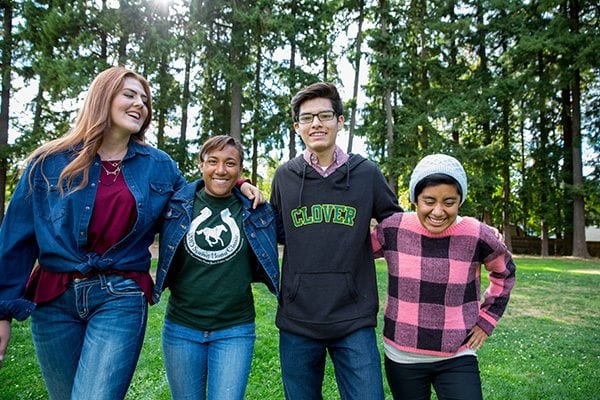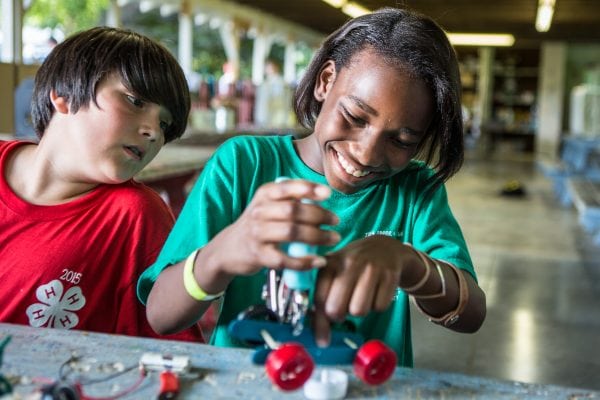About 4-H

Alabama 4-H seeks to empower youth with the skills to lead our communities, our state, our nation, and also our world. Alabama 4-H is open to all youth ages 9–18, exists in all 67 Alabama counties, and is also the largest youth development program in Alabama with more than 109,700 youth reached each year.
Our Reach
109,745 4-H participants | 44,662 enrolled 4-H members | Present in 68 % of Alabama schools |
Residence of 4-H Participants: Farm 3% | Towns 53% | Towns/cities 28% | Suburbs/cities 7% | Central cities 7%
Guiding Principles
Positive Youth Development
 4-H creates the context and content for positive youth development, subscribing to a set of essential elements characteristic of high quality youth development. In addition, Alabama 4-H helps young people see themselves as unique, resilient, life-long learners who actively participate in their own future–setting personal goals and practicing self-determination.
4-H creates the context and content for positive youth development, subscribing to a set of essential elements characteristic of high quality youth development. In addition, Alabama 4-H helps young people see themselves as unique, resilient, life-long learners who actively participate in their own future–setting personal goals and practicing self-determination.
4-H also values results-driven educational opportunities and experiences that are based upon cutting edge youth development research and best practices proven to have impact.
Partnerships
Alabama 4-H values partnerships. 4-H is the youth development program of the US Department of Agriculture and is also implemented by the Cooperative Extension system through over 110+ land-grant colleges and universities. The program creates connections between public and private entities, non-profits, schools, and also community organizations. 4-H funds programming through a partnership of federal, state and local governments, National 4-H Council, state 4-H foundations and other private entities. Alabama 4-H connects youth and also caring adults as partners in planning and striving for individual, and community change. Alabama 4-H engages well-trained, enthusiastic professional staff who lead, advise, and partner with youth and are regularly provided opportunities for personal growth and satisfaction. 4-H recognizes volunteers as critical partners and fosters relationships that lead to positive outcomes for youth and adults.
Learning
 4-H engages the broader community in supporting youth development and also involves youth in building stronger communities through science, healthy living, and civic engagement and leadership. The program designs challenging and interesting experiences with important consideration given to the depth of the content, age appropriateness of the experience and the context in which it is delivered. Alabama 4-H integrates knowledge, skills, and behaviors of formal and non-formal education strategies. In addition, 4-H builds life skills in youth and adults. 4-H youth and adults develop and evaluate intentional learning experiences. The program also evolves to meet the interests and needs of youth and adults. 4-H staff are leaders in high quality youth development, teaching, research, and evaluation. 4-H relies on the extensive network of research from the land-grant universities to support positive youth development and program content.
4-H engages the broader community in supporting youth development and also involves youth in building stronger communities through science, healthy living, and civic engagement and leadership. The program designs challenging and interesting experiences with important consideration given to the depth of the content, age appropriateness of the experience and the context in which it is delivered. Alabama 4-H integrates knowledge, skills, and behaviors of formal and non-formal education strategies. In addition, 4-H builds life skills in youth and adults. 4-H youth and adults develop and evaluate intentional learning experiences. The program also evolves to meet the interests and needs of youth and adults. 4-H staff are leaders in high quality youth development, teaching, research, and evaluation. 4-H relies on the extensive network of research from the land-grant universities to support positive youth development and program content.
Youth
4-H matches the needs, interests, abilities, and also cultural norms of young people, their families, and also their communities. 4-H believes that all young people, as members of families and communities and citizens of a global society, should have the opportunity to reach their full potential. Alabama 4-H builds a culturally competent workforce engaging adults and youth from diverse backgrounds. 4-H is inclusive and embraces diversity. Alabama 4-H values the safety and well-being of youth and adults. In addition, 4-H conducts programs under the authority of the USDA.
Alabama 4-H Goals
- Youth, through 4-H involvement, develop their potential and are leaders in their communities.
- All youth have access and engage in programs and opportunities.
- Youth engage in high quality, diverse, and relevant learning opportunities.
- Youth are surrounded with competent, prepared staff and volunteers.
- The Alabama 4-H system develops the capacity to effectively impact the lives of youth throughout the state.

